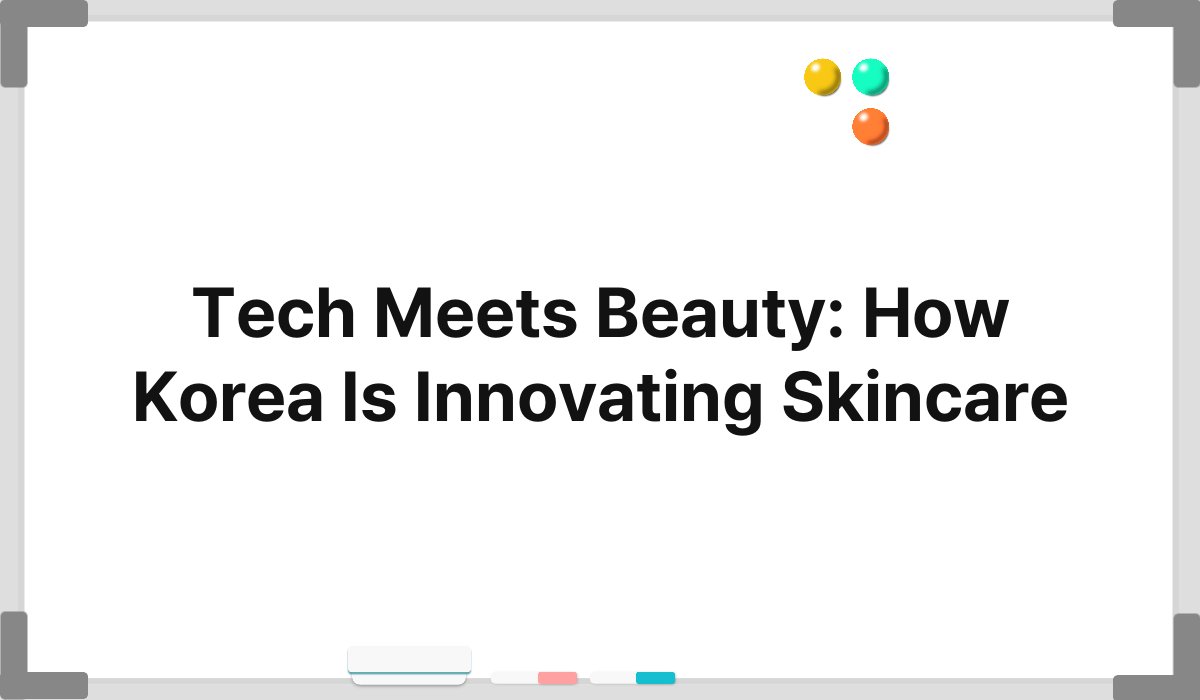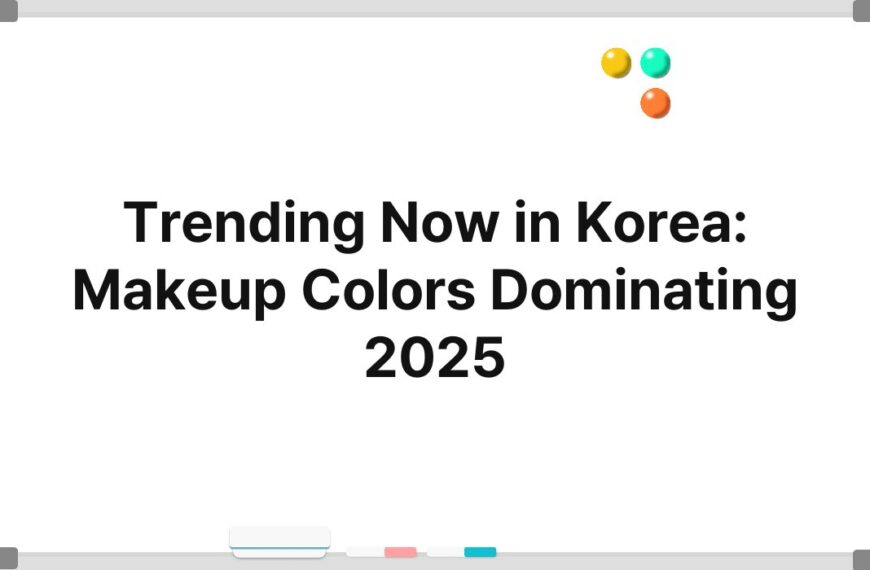[K-Bridge/Samuel] Korea has emerged as a global leader in skincare innovation, seamlessly blending technology with beauty.
This phenomenon, often described as “Tech Meets Beauty,” highlights how advanced scientific research and cutting-edge technology are transforming skincare products and routines.
Korean brands are not only focusing on traditional ingredients but also integrating high-tech solutions to enhance efficacy and user experience.
From AI-driven skin analysis to personalized formulations, Korea is setting new standards in the beauty industry.
By exploring this topic, readers will gain insights into the latest trends, technologies, and the future of skincare in Korea.
The Rise of Technology in Skincare: A Korean Perspective
The intersection of technology and skincare in Korea has been a game-changer, leading to the development of innovative products that cater to diverse skin needs.
Korean companies have embraced advanced technology, utilizing artificial intelligence and machine learning to analyze skin conditions and recommend tailored solutions.
This shift towards personalization has revolutionized the way consumers approach skincare, allowing them to find products that are specifically designed for their unique skin types and concerns.
In recent years, the introduction of smart skincare devices has further enhanced the consumer experience.
These devices often feature sensors that assess skin hydration levels, elasticity, and even detect UV exposure.
By providing real-time data, users can adjust their skincare routines accordingly, ensuring optimal results.
This technological advancement not only empowers consumers but also fosters a deeper understanding of their skin health.
Moreover, the integration of augmented reality (AR) in the beauty industry has transformed the shopping experience.
Virtual try-on applications allow consumers to visualize how products will appear on their skin before making a purchase.
This innovative approach reduces the chances of buyer’s remorse and enhances customer satisfaction, ultimately driving sales for brands.
Innovative Ingredients: Nature Meets Science
Korean skincare is renowned for its unique and effective ingredients, many of which are derived from natural sources.
However, the innovation doesn’t stop there.
The fusion of traditional ingredients with scientific advancements is a hallmark of Korea’s skincare industry.
Brands are now utilizing biotechnology to enhance the efficacy of these natural ingredients, creating products that deliver exceptional results.
For instance, fermentation technology has gained popularity in Korean skincare.
This process not only enhances the absorption of beneficial compounds but also increases the potency of ingredients such as ginseng and green tea.
The result is a range of products that offer superior hydration, brightening, and anti-aging benefits.
This innovative approach has established Korea as a leader in harnessing the power of nature through science.
In addition, the rise of clean beauty has prompted Korean brands to explore sustainable and eco-friendly formulations.
By focusing on ingredients that are both effective and environmentally responsible, these brands are appealing to a growing demographic of conscious consumers.
This trend is reshaping the industry, encouraging a shift towards transparency and sustainability in product development.
Personalized Skincare: The Future of Beauty
Personalization has become a key focus in the Korean skincare market, with brands recognizing the importance of catering to individual skin needs.
This trend has led to the emergence of customized skincare solutions that address specific concerns, such as acne, hyperpigmentation, and aging.
By leveraging technology, companies can now offer consumers tailored products based on their unique skin profiles.
Innovative platforms that analyze skin conditions through AI and machine learning algorithms are at the forefront of this movement.
These platforms typically require users to upload photos of their skin, which are then analyzed to provide personalized recommendations.
This level of customization not only enhances the effectiveness of skincare routines but also fosters a sense of connection between consumers and brands.
Furthermore, subscription services have gained traction, allowing consumers to receive curated skincare products based on their preferences and skin types.
This model not only simplifies the shopping experience but also encourages consumers to explore new products without the commitment of full-sized purchases.
As personalized skincare continues to evolve, it is reshaping consumer expectations and driving brand loyalty.
The Role of Social Media in Skincare Innovation
Social media has played a pivotal role in the evolution of the skincare industry, particularly in Korea.
Platforms like Instagram and TikTok have become essential tools for brands to showcase their products and engage with consumers.
This digital landscape has facilitated the rapid spread of trends, allowing innovative products to gain traction almost overnight.
Influencers and beauty bloggers have become key players in promoting new skincare technologies and products.
Their ability to reach vast audiences has made them invaluable partners for brands looking to launch innovative offerings.
By sharing personal experiences and reviews, these influencers help demystify new technologies, making them more accessible to consumers.
Moreover, social media has fostered a culture of transparency and authenticity.
Consumers are increasingly seeking out brands that prioritize ethical practices and ingredient transparency.
As a result, many Korean skincare brands are now using social media to communicate their values and the science behind their products.
This shift towards openness is reshaping consumer trust and loyalty in the industry.
The Impact of COVID-19 on Skincare Trends
The COVID-19 pandemic has significantly influenced skincare trends, leading to a surge in demand for products that promote skin health and wellness.
As people spent more time indoors, there was a noticeable shift towards self-care routines, with many individuals investing in their skincare regimens.
This trend has accelerated the adoption of innovative technologies and products that cater to the evolving needs of consumers.
In response to the pandemic, brands have introduced products that address specific concerns related to mask-wearing, such as acne and irritation.
These products often incorporate soothing ingredients and are designed to provide relief for skin affected by prolonged mask use.
This adaptability showcases the industry’s ability to respond to consumer needs in real-time.
Additionally, the rise of virtual consultations and online skincare assessments has become a norm.
Brands have leveraged technology to offer personalized recommendations and advice, ensuring that consumers can maintain their skincare routines even during lockdowns.
This shift has highlighted the importance of digital engagement in the beauty industry, paving the way for future innovations.
The Intersection of Beauty and Wellness
The concept of beauty is increasingly intertwined with overall wellness, and Korean skincare brands are leading the charge in this holistic approach.
Consumers are now seeking products that not only enhance their appearance but also promote mental and emotional well-being.
This shift has led to the emergence of wellness-focused skincare lines that prioritize self-care and mindfulness.
Korean brands are incorporating elements such as aromatherapy and calming ingredients into their products, creating a sensory experience that goes beyond traditional skincare.
This focus on wellness has resonated with consumers, particularly in a post-pandemic world where mental health has taken center stage.
Furthermore, the integration of mindfulness practices into skincare routines is gaining popularity.
Brands are encouraging consumers to take a moment for themselves during their skincare rituals, promoting relaxation and self-reflection.
This shift towards a more mindful approach to beauty is redefining the industry, emphasizing the importance of self-care in achieving overall well-being.
The Future of Skincare: Trends to Watch
As the skincare industry continues to evolve, several trends are poised to shape its future.
One notable trend is the increasing emphasis on sustainability and eco-friendly practices.
Consumers are becoming more conscious of their environmental impact, prompting brands to adopt greener formulations and packaging.
This shift towards sustainability is expected to drive innovation as companies seek to meet the demands of eco-conscious consumers.
Another trend to watch is the continued integration of technology in skincare.
As advancements in AI and machine learning progress, brands will likely develop even more sophisticated tools for personalized skincare solutions.
This technological evolution will empower consumers to take control of their skin health, fostering a deeper connection between individuals and their skincare routines.
Lastly, the rise of inclusivity in the beauty industry will continue to gain momentum.
Brands are recognizing the importance of catering to diverse skin tones and types, leading to the development of more inclusive product lines.
This trend reflects a broader societal shift towards acceptance and representation, ultimately enriching the skincare landscape.
By exploring these trends and innovations, it is clear that Korea is at the forefront of a skincare revolution that seamlessly blends technology with beauty.
As the industry continues to evolve, consumers can expect a future filled with exciting possibilities that prioritize personalization, sustainability, and overall well-being.








